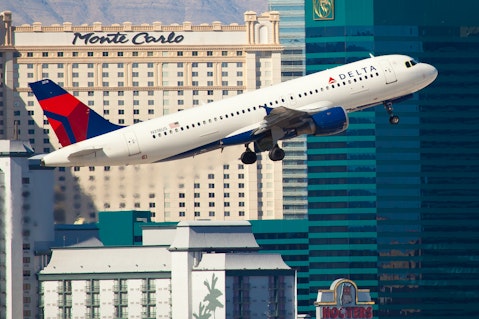This article discusses the 10 best airline stocks to buy according to hedge funds. We also dive deep into trends in the commercial aviation industry, especially the impact the return of international travel to pre-pandemic levels has had on the airline industry.
The coronavirus pandemic wreaked havoc across the global airline industry. According to the International Air Transport Association (IATA), industry revenues slumped from $838 billion in 2019 to $384 billion a year later, registering a 54.1% downfall. However, the market has gradually recovered over the last few years and is on track for solid growth as international travel resumes worldwide.
READ ALSO: 10 Best Airline Stocks To Buy According To Short Sellers and 10 Worst Airline Stocks To Buy According to Short Sellers.
A report by UN Tourism in January this year stated that international tourism was recorded in 2023 at 88% of pre-pandemic levels, and is on track to return to levels before the coronavirus struck. The IATA anticipates global airline revenue to reach $996 billion in 2024, 19% higher than in 2019 and 1.5 times higher than the pandemic low of 2020.
The global travel recovery has been led by the Middle East, the strongest tourism market in 2023, as it welcomed 22% more travelers than it did in 2019, becoming the only region to prevail over pandemic levels. Europe reached 94% of the levels in 2019, while Africa stood at 96%. Asia Pacific has been rather slow, recovering only 65% of pre-pandemic levels as of last year.
The uptick in international travel is yielding solid returns this year. As of October 23, 2024, a major airline ETF issued by U.S. Global Investors has grown by 18.44% YTD, outperforming the broader market by 4.5%. Analysts at Forbes believe airline stocks are poised for strong growth during the second half of 2024 as fuel prices dip after long periods of price hikes. Fuel accounts for between 20-30% of airlines’ total costs. Moreover, airlines in the US are cutting down on excess domestic capacity after compressed margins during the summer season. The oversupply of seats has resulted in lower fares, and airline operators are determined to correct that. The deceleration of capacity, coupled with strong travel demand, will enhance their pricing power and improve earnings.
Hedge fund sentiment on airline stocks is also encouraging. Tony Bancroft from Gabelli Funds shared his insights on commercial aviation at the Morningstar Investment Conference in Chicago on June 26. He noted a significant growth in aircraft orders, resulting in major aircraft manufacturers having a 12-year backlog of orders. Bancroft cited China as the primary catalyst driving robust demand.
According to the portfolio manager, the country represented 20% of all new aircraft orders as Chinese airlines strive to cater to the growing demand for travel among the middle class at home and in neighboring India. Bancroft also highlighted the rising middle class in the United States and other parts of the world that are increasing international travel, and contributing to the strength of the commercial aviation industry.
With that in mind, let’s now head over to the list of the best airline stocks to buy according to hedge funds.

Chris Parypa Photography / Shutterstock.com
Methodology
We sampled stocks from ETFs with airline exposure and then picked the top 10 companies with the highest number of hedge funds having stakes in them. We ranked them in ascending order of hedge fund holders in each company. Data on hedge funds was sourced from Insider Monkey’s database of 912 hedge funds for the second quarter of 2024.
Why are we interested in the stocks that hedge funds pile into? The reason is simple: our research has shown that we can outperform the market by imitating the top stock picks of the best hedge funds. Our quarterly newsletter’s strategy selects 14 small-cap and large-cap stocks every quarter and has returned 275% since May 2014, beating its benchmark by 150 percentage points (see more details here).
10 Best Airline Stocks to Buy According to Hedge Funds:
10. Allegiant Travel Company (NASDAQ:ALGT)
Number of Hedge Fund Holders: 17
Allegiant Travel Company (NASDAQ:ALGT) is an airline holding and hospitality corporation headquartered in Las Vegas, Nevada. The company offers flight transport, car rentals, hotel bookings, and other related travel services. It owns Allegiant Air, an American airline that serves leisure traffic from underserved small and medium cities. The airline has a low-cost business model, offering reduced fares with minimal offerings while charging for add-ons during the flight.
The business model allows the company to have multiple streams of ancillary revenue, which includes charges for services beyond airfare, like food meals, seat selection, extra baggage, and more. This is one of the key strengths of Allegiant Air in helping the airline maintain profitability while keeping base ticket prices competitive.
Allegiant Travel Company (NASDAQ:ALGT) announced its quarterly results for Q2 2024 on July 31. It generated a total operating revenue of $666.3 million, of which $649.5 million was contributed by its airline operations. Consolidated net income for the quarter totaled $32.5 million. Consolidated EPS stood at $1.77, while for the airline, it was recorded at $2.24 per share, comfortably beating the company’s initial expectations.
The company attributed strong results for Allegiant Air to a higher-than-anticipated top-live revenue and improved cost performance, the latter driven by a lower-than-forecasted average fuel cost per gallon. Ancillary revenue also outperformed during the quarter and reached $75.34 per passenger, representing a 5% year-over-year increase, and driven by strength in co-brand, seat selection, and baggage.
Looking ahead, the third quarter is typically a low-performing period for Allegiant, and the challenges it has faced heading into Q3 will likely impact the financial results. The airline’s peak utilization for summer months was still 20% below 2019’s average of 9.5 hours per aircraft, noted Greg Anderson, President and Incoming CEO, in Allegiant’s Q2 earnings call. Moreover, losses at Sunseeker Resorts, the global tech outage in July, and aircraft delivery delays from Boeing are also projected to take their toll. As a result, the company forecasts a loss per share of $3 in Q3.
However, Allegiant Travel Company (NASDAQ:ALGT)’s outlook for 2025 is encouraging. The company expects increased peak period utilization starting next year and is hopeful of a normalized aircraft delivery pattern from Boeing in 2025 and 2026. It is also working on optimizing its next-gen revenue management system Navitaire, which is estimated to yield an incremental $4 per passenger when it is functional.
Wall Street analysts have a Hold rating for the stock and expect an average appreciation of 1.2% in its share price. As of Q2 2024, 17 hedge funds among those tracked by Insider Monkey have investments in Allegiant Travel Company, making it one of the best airline stocks to buy according to hedge funds.
9. JetBlue Airways Corporation (NASDAQ:JBLU)
Number of Hedge Fund Holders: 19
JetBlue Airways Corporation (NASDAQ:JBLU) is a major airline in the United States that operates over 1,000 daily flights across destinations in the US, Latin America, the Caribbean, and parts of Europe. It flies out of six main airports, with its primary hub at JFK International Airport in New York. With 19 hedge funds, from amongst the ones tracked by Insider Monkey, having investments in the company as of Q2 2024, JetBlue Airways Corporation is one of the best airline stocks to buy according to hedge funds.
The company’s share price has surged 10% since announcing its second-quarter results in July. In Q2, it generated net earnings of $25 million or $0.07 earnings per share under GAAP, beating Wall Street analysts’ expectations of a quarterly loss. Pre-tax income for the quarter stood at $34 million. JetBlue Airways credited these results to a strong performance in its premium product offerings and ongoing cost-saving programs aided by a drop in fuel prices.
In recent months, the airline has actively tried to reduce costs by cutting unprofitable routes amid challenges emanating from an oversupplied domestic market and increased expenses. So far this year, JetBlue Airways has closed 50 routes and has shifted focus to its core franchises, which have long been the profit engine for the company. These include New York, New England, Florida, Puerto Rico, and the Caribbean.
While measures that have contributed to the earnings in Q2 are encouraging, they are said to be not enough to ensure the company posts a profit for the full fiscal year. The company hasn’t posted an annual profit since before the pandemic. It has been grappling with engine issues with Pratt & Whitney’s GTF turbofans for quite some time, resulting in an increased number of grounded aircraft and bloating expenses associated with inspections.
During the Q2 earnings call, JetBlue Airways announced that it was deferring the delivery of 44 Airbus A321neo aircraft to 2030. This is the fleet most impacted by the Pratt & Whitney issue. This decision is expected to help the company reduce its capital expenditure by $3 billion through 2029, and improve cash flow.
Most of these initiatives will take time to ramp to their full potential, but the management is confident that its strategy (called JetForward) to enhance operational efficiencies, reduce costs, restructure routes, and simplify its fleet will start to pay dividends as early as next year. It expects to generate $800 – $900 million of incremental EBIT from 2025-2027 through these measures.
8. Ryanair Holdings plc (NASDAQ:RYAAY)
Number of Hedge Fund Holders: 20
Ryanair Holdings plc (NASDAQ:RYAAY) is the parent company of Irish low-cost carrier, Ryanair. As of 2023, it is the largest airline group in Europe in terms of number of passengers. The group’s subsidiaries also include Buzz Airlines, Lauda Europe, and Ryanair UK.
The company announced its first-quarter FY 2025 results in July. During the quarter, it generated a profit of EUR 360 million (approx. $390 million), which was down 46% year-over-year. EPS for the quarter stood at $1.69, well below analysts’ forecasts of $2.89 per share. This was despite a 10% traffic growth during the quarter. Ryanair attributed these weaker results to lower-than-expected airfares and the first half of Easter falling into the prior year’s Q4.
The low-cost airline earns significant profits from close-in bookings. However, each time during the last few weeks in Q1 FY25, when it removed low-fare tickets for last-minute bookings, the higher-priced tickets did not sell, according to Reuters. CEO Michael O’Leary has stated that the airline is increasingly seeing price resistance from customers and it plans on aggressively advertising low fares ahead. CFO Neil Sorahan believes the consumers have become more ‘frugal’ and ‘cautious’ after two years of considerable rise in airfares.
Despite the headwinds, Wall Street analysts are bullish on the stock and have a consensus on its Buy rating. They anticipate a 38% rise on average in its share price. This is likely due to the airline seeing record summer scheduled bookings – albeit at lower prices – with over 200 new routes and five new bases. During the Q2 earnings call, O’Leary said the airline was operating its ‘largest ever schedule’ this summer.
Another factor contributing to the company’s strength is its strong balance sheet. It ended the quarter with EUR 4.5 billion in gross cash, with net cash improving from EUR 1.4 billion to EUR 1.7 billion, reflecting the airline’s solid foundations. It continues to be one of the best airline stocks to buy according to hedge funds.
7. Southwest Airlines Co. (NYSE:LUV)
Number of Hedge Fund Holders: 23
Southwest Airlines Co. (NYSE:LUV) is a major airline based in the United States, that offers flights from 117 airports across 11 countries. The low-cost carrier operates on a point-to-point model enabling direct flights between destinations, and eliminating the time and distance taken when traveling with airlines that require passengers to travel through a conventional hub.
During the second quarter of 2024, Southwest Airlines generated a revenue of $7.35 billion, beating expectations of $7.32 billion, and up 4.5% from last year. Net income for Q2 stood at $367 million, resulting in an EPS of 58 cents, which beat estimates, but was down 46% year-over-year. The company’s earnings continue to be burdened, partly driven by plane delivery delays from Boeing, which has depressed revenues and increased pressures on costs. The airline has also been greatly affected by dampened airfares amid overcapacity in the domestic market.
According to a September report in the Associated Press, the company’s shares have lost around half of their value over the past three years due to these factors, which has led to increased investor pressure to improve performance. Elliott Investment Management, a hedge fund, has launched a campaign to call a special meeting of shareholders to dump CEO Bob Jordan and replace two-thirds of the board of directors for underperformance.
The airline has recently announced plans to end its open-seating policy and begin offering premium seating, in a bid to elevate customer experience and drive shareholder value. Southwest Airlines expects revenue from its new seat model and extra legspace to be north of what it generates from its ancillary offerings. The company will also be starting red-eye flights in early 2025. Southwest has also been improving its operational systems, which helped the company stay largely unaffected by the global tech outage in July.
While hedge fund sentiment towards the company has dipped significantly – from 33 hedge funds having investments in the stock in Q1 to just 23 in Q2 – because of the ongoing headwinds, Southwest Airlines Co. (NYSE:LUV) continues to be one of the best airline stocks to buy according to hedge funds.
6. Copa Holdings, S.A. (NYSE:CPA)
Number of Hedge Fund Holders: 24
Copa Holdings, S.A. (NYSE:CPA) is a publicly traded airline passenger and cargo service company. It owns two airlines: Copa Airlines, which provides international air transportation through its hub in Panama City, and Copa Airlines Colombia, which operates domestic and international flights from various cities in Colombia.
According to Insider Monkey’s database for Q2 2024, 24 hedge funds held stakes in the company, making it one of the best airline stocks to buy according to hedge funds. Renaissance Technologies is the biggest investor in the company, among those tracked by Insider Monkey, with its holding valued at $82.99 million as of June 30, 2024.
The company reported robust results during the second quarter of 2024, earning a net profit of $120.3 million, with EPS logged at $2.88. Its operating margin stood at 19.5%, making it the second-best quarter in the airline’s history. The strong performance was driven by a 10.6% increase in passenger traffic from the same period last year. Capacity increased by 9.7% during the quarter, resulting in a 0.7% increase in load factor, which now stands at 86.8%.
Another metric that paints a promising picture of the company is the 5.8% year-over-year decline in cost per average seat mile, driven by lower sales and distribution charges and reduced aircraft maintenance costs. Low sales and distribution costs were attributed to most passengers directly booking their flights from Copa Holdings, S.A. (NYSE:CPA), instead of third-party channels. Customers also increasingly utilize the low-cost NDC travel agency channel.
Looking ahead, the airline is aiming to ramp up its capacity between September and December to reach full capacity by the end of the year. It has also reaffirmed its operating margin for the full year 2024 to be in the range of 21% to 23%. This has led to a bullish sentiment around the stock. Wall Street analysts have consensus on the stock’s Strong Buy rating and anticipate a near 49% upside potential, on average, in its share price.
The company does face a challenge emanating from the suspension of flight operations to Venezuela which is likely to affect its capacity and unit revenue guidance. However, the overall outlook for the company remains positive.
5. SkyWest, Inc. (NASDAQ:SKYW)
Number of Hedge Fund Holders: 28
SkyWest, Inc. (NASDAQ:SKYW) is the holding company for SkyWest Airlines, a regional North American air carrier that offers scheduled passenger service for flights operated under code-share agreements with United Airlines, Delta Air Lines, Alaska Airlines, or American Airlines. Besides this, the company also offers chartered flights on-demand through its SkyWest Charter division. Moreover, its leasing company, SkyWest Leasing, leases aircraft and engines to third parties, which further enhances its revenue potential.
The company generated $867 million in revenue during Q2 2024, up 8% sequentially from the first quarter, and 19% higher year-over-year, driven by high demand, the strength of its partnerships, and ongoing improvements in staffing. Net income for the quarter was posted at $76 million, representing earnings per share of $1.82, which beat analysts’ expectations of $1.73 per share.
SkyWest, Inc. remains confident about the rest of the year and its outlook for 2025. It is anticipating a 9% to 11% increase in block hours compared to 2023, up from initial expectations of 7% to 9% at the end of Q1. The revised guidance has been driven by improving pilot availability, strong demand from the company’s partners, and increasing fleet utilization. GAAP EPS is forecast to be in the north of $6.
The airline is also committed to giving back to shareholders and has repurchased 10.9 million shares for $311 million since the beginning of 2024. It is also significantly reducing its debt, fueled by solid positive free cash flow. The company’s debt came down to $2.8 billion at the end of Q2, from $3 billion as of year-end 2023. It is on track to repay over $400 million debt in 2024.
These results have led to a bullish sentiment around the stock. Street analysts have a consensus on the stock’s Buy rating. Hedge funds are also encouraged by the company’s trajectory. ClearBridge Small Cap Value Strategy stated the following regarding SkyWest, Inc. (NASDAQ:SKYW) in its Q2 2024 investor letter:
We also added a new position in SkyWest, Inc. (NASDAQ:SKYW), a regional airline operator. The company reported strong quarterly earnings as its pilot attrition declines and fleet utilization improves. We believe that SkyWest continues to find opportunities to deploy capital in a value-accretive manner, acquiring more planes under long-term contracts. We think earnings should hold up in a potential recession and perhaps even improve further if major airlines reduce capacity and more pilots become available for SkyWest.
According to Insider Monkey’s database for Q2 2024, 28 hedge funds have investments in the company, making it one of the best airline stocks to buy according to hedge funds. SW Investment Management is the most dominant stakeholder in SkyWest, among hedge funds tracked by Insider Monkey, with holdings valued at $49.24 million, as of June 30, 2024.
4. Alaska Air Group, Inc. (NYSE:ALK)
Number of Hedge Fund Holders: 30
Alaska Air Group, Inc. (NYSE:ALK) is an American airline holding company that owns Alaska Airlines, one of the largest airlines in North America.
It is one of the best airline stocks to buy according to hedge funds. Citadel Investment Group has the most dominant holding in the company, among hedge funds tracked by Insider Monkey, owning over 3.9 million shares valued at nearly $158 million, as of the end of Q2 2024. Driven by robust financial performance, hedge fund sentiment continues to improve as well, with the number of hedge funds investing in the company growing from 28 in Q1 to 30 at the end of the second quarter.
The company had another strong quarter in Q2, posting a revenue of $2.9 billion, the highest quarterly result in its history. Nearly $1 billion of this was contributed by premium segments. GAAP net income for the quarter was recorded at $220 million, while adjusted net income was recorded at $327 million. It also posted an industry-leading adjusted pre-tax margin of 15.8%.
Looking ahead, the company was encouraged by advanced bookings during Q3, especially for August and September, which were outpacing the expected capacity growth of 2-3%. However, it expects some pressure from labor costs, provided a tentative agreement with flight attendants for a 32% increase in compensation is ratified.
While final results for Q3 are still awaited, a major story broke on September 18, with Alaska Air Group, Inc. (NYSE:ALK) announcing a $1.9 billion acquisition of Hawaiian Airlines, after reaching an agreement with the U.S. Department of Transportation. The two airlines agreed to maintain key Hawaiian routes under a six-year agreement. The deal is set to further enhance Alaska’s strength and broaden its presence in both domestic and international markets.
This acquisition has led to a bullish sentiment around the stock. Wall Street analysts forecast a near 20% appreciation in Alaska’s share price while maintaining the stock’s Strong Buy rating.
3. American Airlines Group Inc. (NASDAQ:AAL)
Number of Hedge Fund Holders: 38
American Airlines Group Inc. (NASDAQ:AAL) is an airline holding company, which owns American Airlines – one of the largest commercial airlines in the world with over 900 aircraft in its fleet, flying passengers to more than 350 destinations worldwide.
The airline operates around 6,700 flights daily to and from its strong network of hubs in various key cities of the United States. These include Charlotte, Chicago, Dallas-Fort Worth, Los Angeles, Miami, New York, Philadelphia, Phoenix and Washington, D.C.
During Q2 2024, American Airlines Group announced a record quarterly revenue of $14.3 billion, up 2% year-over-year, and posted an adjusted pre-tax profit of $1 billion. Net income for the second quarter stood at $774 million, translating to earnings per share of $1.09. The results were in line with the revised guidance issued in May. However, CEO Robert Isom admitted that the revenue performance was not where the company wanted it to be.
The air carrier’s revenues have been affected by an imbalance between domestic supply and demand, which has prompted airlines to discount tickets, resulting in weaker pricing. Unit revenue was down 5.6% during Q2. The company’s figures have also been negatively affected by approximately $750 million year-to-date from its ineffective sales and distribution strategies.
The airline has now vowed to diligently ensure that capacity does not outgrow demand. The management has decided to lower capacity growth for the back half of the year and plans for a capacity increase of 3% in the third quarter. With these measures, the company expects full-year TRASM to be down between 3% and 5% compared to 2023. It also anticipates achieving cost savings worth $400 million in 2024 and is working on a course correction plan for its sales and distribution strategy.
The company is confident of overcoming the headwinds it currently faces to further solidify its position in the industry. Wall Street analysts also remain bullish on the stock and have consensus on American Airlines Group Inc. (NASDAQ:AAL)’s Buy rating, with an average share price upside potential of 5.50%. Moreover, as of June 30, 2024, 38 hedge funds tracked by Insider Monkey had investments in the company, making it one of the best airline stocks to buy according to hedge funds.
One reason driving investor confidence is the airline’s strong liquidity position. During Q2 2024, American Airlines generated $850 million of free cash flow, which meant it ended the quarter with $11.7 billion in total available liquidity. It also ended debt worth $680 million during the quarter, taking the total debt reduction figure from the peak levels of 2021 to $13 billion. The airline is on track to reduce debt by $15 billion from peak levels by the end of 2025.
2. Delta Air Lines, Inc. (NYSE:DAL)
Number of Hedge Fund Holders: 51
Delta Air Lines, Inc. (NYSE:DAL) is a major American airline, headquartered in Atlanta, Georgia. It is the oldest operating airline in the United States, with its first passenger flight taking off nearly a century ago in 1929. The air carrier operates more than 4,000 daily flights to 275 destinations, across six continents.
The company announced its September quarter results on October 10. Delta Air Lines generated earnings of $971 million during the quarter, down 26% from $1.31 billion last year. As a result, its EPS of $1.50 fell short of expectations of $1.52 per share. The dip in earnings was significantly affected by the CrowdStrike-caused outage which resulted in direct losses of $380 million, primarily driven by canceled flights. It also incurred an additional $170 million in customer expense reimbursements and crew-related costs.
However, the airline is confident about finishing the year strong and anticipates a return to year-over-year earnings growth in the fourth quarter, driven by continued demand for its premium offerings. Delta Air Lines is also seeing healthy bookings for Thanksgiving and Christmas holidays, increasing the optimism for improved results.
The company expects total revenue during Q4 to grow 2% to 4% compared to 2023, aided by a 4% higher capacity level. EPS for the December quarter is forecast to be $1.60 to $1.85 per share on 11% to 13% operating margins. Guidance for Q4 takes into account a 20% expected decrease in fuel prices to hover in the range of $2.20 to $2.40 per gallon, which is likely to help earnings. A brief drop in travel spending around the presidential elections in November is also part of the forecast.
The overall sentiment around the stock is bullish as international travel recovers to pre-pandemic levels, and the holiday season coming ahead. Wall Street analysts have consensus on Delta Air Lines, Inc. (NYSE:DAL)’s Strong Buy rating and anticipate a 17% uptick, on average, in its share price. It is also one of the best airline stocks to buy according to hedge funds. According to Insider Monkey’s database, 51 hedge funds tracked by the financial website held a stake in the airline, as of Q2 2024.
1. United Airlines Holdings, Inc. (NASDAQ:UAL)
Number of Hedge Fund Holders: 56
United Airlines Holdings, Inc. (NASDAQ:UAL) is a publicly traded company that owns and operates United Airlines, one of the leading carriers across the Atlantic and Pacific. The airline flies around 140 million passengers annually to over 300 destinations across six continents.
On October 15, the company reported robust results for the year’s third quarter. Top-line revenue reached $14.8 billion, expanding 2.5%, driven by a 4.1% increase in capacity and declining fuel prices. Despite setbacks from the CrowdStrike outage and suspension of flights to Aman and Tel Aviv amid the turmoil in the Middle East, net income for Q3 stood at $965 million, translating to earnings per share of $3.33 which beat analysts’ forecasts and United’s estimates made in July.
United Airlines shares have risen nearly 16% since the announcement of Q3 results. The closing price of $72.02 on October 16 was the highest since February 2020, before coronavirus was declared a pandemic. After higher-than-anticipated earnings during the quarter, the company’s board of directors approved a $1.5 billion share repurchase program to be executed beginning in Q4 and throughout 2025.
This would be the first share buyback program after Covid-19. The decision has been slammed by United’s flight attendants’ union. The Association of Flight Attendants-CWA (AFA), which represents crews of several carriers including United, stated that the money promised to Wall Street belonged to flight attendants who worked on the frontlines during the pandemic and the recovery period that followed.
The airline has been continuously facing labor pressures for some time. In August, it entered negotiations with the Teamsters union which is pushing for new labor contracts covering 10,000 aviation maintenance and related workers across the country, seeking higher wages, improved healthcare benefits, and safety standards.
However, despite these challenges, United’s prospects look promising. It has already entered Q4 at the back of strong momentum across the Atlantic having exited Q3 with RASM growth of over 4%. The company witnessed strong corporate demand across all regions in September and expects it to continue in the fourth quarter. EPS for Q4 is anticipated to be in the range of $2.50 to $3.00.
Wall Street analysts have consensus on United Airlines Holdings, Inc. (NASDAQ:UAL)’s Strong Buy rating, with an average share price upside potential of 6.38%. Hedge fund sentiment also continues to improve. The number of hedge fund holders having investments in the company has grown from 46 at the end of Q1 to 56 as of Q2, according to Insider Monkey’s database. United Airlines is currently the best airline stock to buy according to hedge funds.
Overall, UAL ranks first among the 10 Best Airline Stocks to Buy According to Hegde Funds. While we acknowledge the potential of airline companies, our conviction lies in the belief that AI stocks hold greater promise for delivering higher returns, and doing so within a shorter timeframe. If you are looking for an AI stock that is more promising than UAL but that trades at less than 5 times its earnings, check out our report about the cheapest AI stock.
READ NEXT: 8 Best Wide Moat Stocks to Buy Now and 30 Most Important AI Stocks According to BlackRock
Disclosure: None. Insider Monkey focuses on uncovering the best investment ideas of hedge funds and insiders. Please subscribe to our free daily e-newsletter to get the latest investment ideas from hedge funds’ investor letters by entering your email address below.





